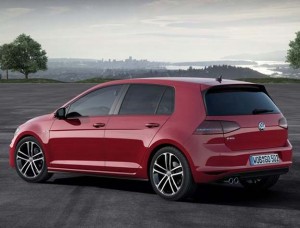
VW is looking to beat 10 million units in worldwide sales with vehicles like the Golf GTD this year.
Trying to get a clear sense of how to read Volkswagen’s latest numbers might leave you scratching your head and, indeed, a quick look at the ways the results are being reported – and the comments made by the company’s top leaders – might only add to the confusion. The interpretation might depend on whether you look at the half-full or half-empty side.
What’s indisputable is that VW’s net income took a sharp, 58% drop for 2013. The German maker made €9 billion, or $12.5 billion last year, down from €21.7 billion in 2012. But if you leave out taxes and one-time charges, operating earnings rose ever so slightly to €11.7 billion euros, or $16.3 billion, from 11.5 billion euros the year before. And sales rose 2.2% to €197 billion.
Now, jump ahead slightly, the Volkswagen assemblage of vehicle brands scoring a 4% increase in unit volume for January and February and CEO Martin Winterkorn is predicting, “There is a good chance that we will already exceed the 10 million deliveries mark this year.”
That would put it in a neck-and-next race with Toyota, both of whom want to be the first automaker ever to hit that milestone in a single year. The Japanese automaker does have the edge as the global best-seller in 2013, but VW did better than expected last year, nudging past General Motors to let Toyota see it racing up in the rearview mirror.
What’s also hard fact is that much of VW’s momentum is coming from its luxury brands. Bentley and Lamborghini are selling six-figure vehicles as fast as they can be assembled, and the Audi brand is putting a scare into its competitors as it racks up record sales. In fact, it has nudged past global luxury leader BMW for the first time this year, though IHS Automotive expects it will slip back into second place for all of 2014.
Then there’s Porsche, which also has been setting sales records and is looking for even better numbers as it launches new products, including the compact ute, the Macan, which it is betting will soon become its second-best-selling model line.
And while VW’s mass-market models, like the Jetta or Passat, are generating meager returns of an average $850 apiece – or 2.9% profit margins – the figures jump to $23,200 in profits on each Porsche, an 18% margin. Audi, incidentally, was in the 10% range, at about $5,200 profit per vehicle.
Nonetheless, Winterkorn threw some cold water onto his own upbeat news, cautioning that, “In light of the uncertainties, our forecast for 2014 is comparatively cautious.” A key reason? The continuing downturn in its home region. “The automotive year 2013 was especially for European carmakers extremely challenging,” he stressed.
(Switchgate: What did GM know and when did it know it? For more, Click Here.)
Winterkorn isn’t the only industry leader who seems to be straddling the fence when it comes to looking ahead, and particularly when it comes to Europe. During a media briefing at the Geneva Motor Show last week, Fiat Chrysler Automobiles CEO Sergio Marchionne declared himself “generally optimistic” about the situation on the Continent. But he then went on to warn that there’s little chance of any real recovery after likely bottoming out in 2013. Marchionne warned that over-capacity remains a “big problem for Europe” that will continue to hurt mass-market brands like Fiat – and VW.
(Click Here to check out the raises that Toyota workers got for the first time since 2008.)
Another thing the two executives have in common is there vision of where their big opportunities lie. “China remains the growth engine—for us and the entire industry,” said Winterkorn, echoing Marchionne’s comments in Geneva.
(To see how the Chrysler 200 brought one Detroit-area plant back from the abyss, Click Here.)
But where Fiat Chrysler has its challenges in what’s now the world’s largest automotive market – including locking down a production plan for its Jeep brand – VW is firmly entrenched in China and last year pushed past rival GM to become the market’s leader.
So, sorting it all out is understandably difficult. There are certainly reasons for Winterkorn’s concerns – and for his optimism, as well.

Without China’s growing sales all of the major car makers would be in trouble which should be a warning sign.